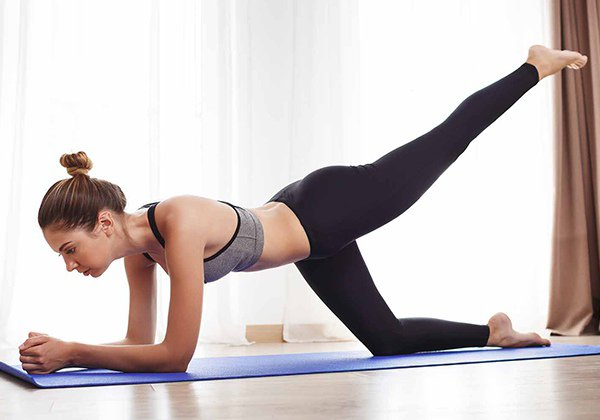Menopause is a transitional period in a woman’s life, defined as the absence of menstruation for more than 10-12 months. During this period, women tend to experience hormonal imbalance and emotional changes…
Common symptoms include hot flashes , weight gain, night sweats, insomnia, frequent urination, depression , irritability, dry skin, hair loss, headaches and decreased sex drive… Women’s cardiovascular diseases including heart attack, stroke and osteoporosis… increase significantly after menopause.
Regular exercise will help improve your mood, reduce your risk of heart disease and overcome these symptoms.

Hot flashes, weight gain, night sweats, insomnia… are common symptoms of menopause.
Benefits of exercise during menopause
Dr. Anuja Thomas, obstetrician and gynecologist, Motherhood Kharghar Hospital, Mumbai (India), said that exercise not only helps reduce common menopausal symptoms, such as mood changes, hot flashes… but also plays a role in reducing symptoms of menopause. important role in maintaining bone density, which tends to decrease with age, increasing the risk of osteoporosis.
Exercise can help relieve many of the most common menopause symptoms:
– Improves cardiovascular health: The risk of cardiovascular disease increases during menopause. Regular exercise can help keep your heart healthy, increasing HDL (good) cholesterol, lowering LDL (bad) cholesterol and lowering blood pressure. Exercise also reduces the risk of heart attack and stroke.
– Increase bone mass: Because estrogen (which helps strengthen bones) decreases during menopause, you are at risk of osteoporosis. Exercise can preserve and build bone density.
– Reduce symptoms of depression and improve mood: Anxious, depressed or sad mood… often occurs during menopause (due to declining estrogen levels). Regular exercise can help improve the mood of postmenopausal women.
– Improve sleep: Sleep disorders and insomnia are common during menopause and can affect a woman’s quality of life. Exercise can help improve sleep quality during menopause.
– Improve sexual function: Menopausal women often have weak pelvic floor muscles, which can affect sexual function. Pelvic floor exercises, which strengthen these muscles, can help improve sexual function.
– Improved bladder control : Weaker pelvic floor muscles can also lead to bladder problems, such as urinary incontinence… Improving pelvic floor strength can help improve bladder control control of the bladder.

Exercise is a beneficial option for improving muscle mass and bone mineral density.During menopause, women often experience many physical and emotional changes. Strength training is a beneficial option for improving muscle mass and bone mineral density…
Some good exercises for menopausal women
– Strength training: Strength training has many positive effects on menopausal symptoms, helping to improve strength, bone density, heart rate and blood pressure… These movements also increase lean muscle mass. , increase metabolism. Aim to do total-body strength training twice a week.
Examples of some exercises you can incorporate include:
- Squat
- Push-ups
- Pull up bar…
You can also use dumbbells, resistance bands, body weight or weight machines… during strength training.
Cardiovascular exercises: High-impact cardiovascular exercises include running, jumping rope and tennis. Lower-impact cardiovascular exercises like swimming, walking, dancing, working out on the elliptical or stair machine, etc. Aim for at least 30 minutes of moderate-intensity exercise every day, five days at a time. week. This will help burn calories, strengthen the cardiovascular system and improve blood pressure…
– Pelvic floor muscle exercises: Kegel exercises (tightening and relaxing the pelvic floor muscles) help improve sexual function, as well as bladder symptoms… (common in menopausal women)
– Tai chi: Helps improve balance, increase flexibility and stability of the body, and prevent falls.
– Yoga : Helps soothe menopausal symptoms, especially those related to mood. Like tai chi, yoga helps improve balance, flexibility and reduce stress . These poses also help improve core strength, as well as pelvic floor strength.
Relaxation exercises: According to the North American Menopause Society, relaxation exercises such as deep breathing and meditation can help reduce stress and the severity of hot flashes. Practicing mindfulness regularly can reduce stress, improve focus, along with other mental health benefits.









